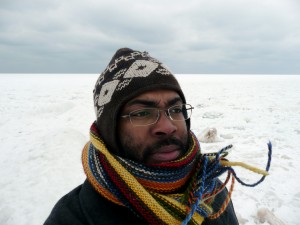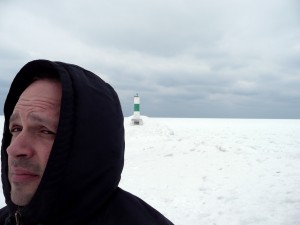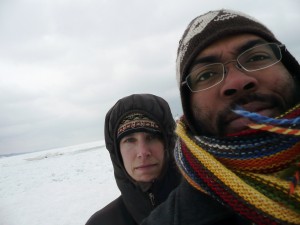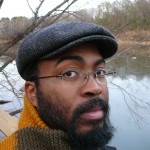Almost two months ago I found myself on the shores of Lake Michigan near Holland, Michigan. That’s where I took this photograph of myself.
I was in Holland, Michigan, at Hope College for their Jack Ridl Visiting Writers Series with my dear friend the poet Elizabeth Bradfield. An old friend who’s a professor at Hope College, the poet Pablo Peschiera, brought us there. Among other things Liz and I talked about historical research and poetry. We had a great time visiting with Pablo and his students. And we gave a reading at the Knickerbocker Theatre in downtown Holland.
It’s always a great pleasure to read with Liz and hear read her wonder-filled poems. She read poems from Interpretive Work, her first book, and from her second book Approaching Ice, which is about polar explorers and the history of polar exploration.
Before taking us back to the airport in Grand Rapids, Pablo took us out to Lake Michigan. I found looking out into the lake where as far as I could see there was ice and snow, fascinating. I know the lake doesn’t freeze completely over, but from where I stood it looked like ice and snow stretched away to the horizon. That’s what’s behind me in the photograph above. The expansive vista that day gave me the sense of potentiality, like in the vastness great things were possible—it’s a hopeful feeling. Maybe this is some sort of semantic confusion that has become emotional for me.
This is the opposite reaction I had to my very first experience with wide-open spaces. I was born and raised in central Georgia a place that doesn’t offer this kind of view. Almost a dozen years ago I took my first road trip across the lower part of the United States, and a couple days after we left east Texas and started getting into the vastness I felt anxiety displacing my usual calm. It culminated with me not being able to sleep in Albuquerque. The room felt like it was spinning and I was overwhelmed by a sense that my family and Georgia and maybe most of the East Coast (the known world to me at the time) had somehow gone to oblivion, not been devastated by natural or manmade disaster but been erased, excised, just didn’t exist. Maybe like if I could see as far as I could in those open spaces and not see my family then they must not exist. I’d driven up to New York and New Jersey and not felt this before. There was something about the distances in this case—how far we’d driven but probably more importantly how far I could see.
All of this and the photo of me above reminded me of Matthew Henson, a polar explorer with Admiral Robert Peary who claimed to be the first to reach the geographic North Pole in 1909. Henson, an African American, skilled navigator and able seaman, was a longtime associate of Peary’s and accompanied him on a number of expeditions. Liz has a great poem in Approaching Ice about Henson, “Polar Explorer Matthew Henson, Assistant to Admiral Peary (1909).”
I’ve decided that I need to walk over to the Bemidji Public Library to see if I can find or order a copy of Henson’s autobiography, A Negro Explorer at the North Pole. It’ll be a good way to celebrate the receding of the snow and arrival, albeit slow, of spring to Bemidji.





